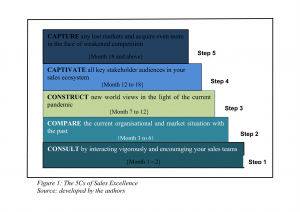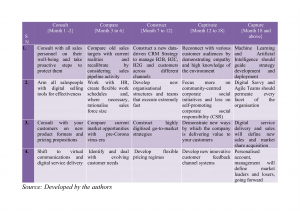The coronavirus, an invasive disease that has afflicted millions worldwide and caused over a hundred thousand deaths, has crippled millions of businesses, and presently threatens many more. This article puts forth the argument that sales is the lifeblood of every organisation and companies that best manage their sales functions, stand a good chance of surviving this pandemic (COVID-19) era. Sales is one of the key strategies for attaining competitive advantage and, ultimately, increasing the profitability of businesses (Pettijohn & Pettijohn, 1994), and this assertion has never been more accurate than in this season.
COVID-19 and the Sales Function
The spread of coronavirus has ruined most business activities, models, and strategic intents. Companies that will survive after the pandemic subsides are those who have demonstrated high degrees of innovation, creativity, and resilience. With closed offices, remote communication, health concerns, and challenges with suppliers and customers, it is only astute salespeople that can leverage and turn this crisis into opportunities to scale up their profit. Hence, the salespeople and executive teams who are going to lead the charge to return companies to normalcy and eventual profitability will have to employ the 5Cs of Sales Excellence (see Figure 1 below) to enjoy continued sales success in the light of the global pandemic.
Figure 1: The 5Cs of Sales Excellence
Table 1 below provides a detailed description of the 5C model of Consult, Compare, Construct, Captivate and Capture, which ranges from short to medium term sales stabilisation to long term sustained value realisation.
Table 1: Tabular categorisation of ‘The 5Cs of Sales Excellence’
The short to medium-term process must focus on sales stabilisation. This temporal process, which occurs between three to six months, focuses on the need to consult with identified stakeholders, compare sales targets, current and market opportunities- pre and post-pandemic era. In the long term, sustained value realisation will be the goal, where the sales team must construct a new working environment that will deliver value-added services swiftly, capture lost markets and win new customers, especially in the light of a burgeoning digital era.
Consultation: This is the phase that involves in-depth discussions with employees and consumers during a crisis. In the course of the COVID-19 crisis, employees look forward to messages from employers, showing some measure of empathy, encouragement and consideration. These employees desire to be carried along on the steps that the organisation is taking to ensure that their sales trajectory is not affected by the crisis. It is important for organisations to arm the employees with relevant information and virtual tools necessary to improve their capabilities while the crisis persists. Such tools expand the mental horizon of the employees and enable their confidence in the organisation to grow. They also become better representatives of the organisation such that its values begin to align with theirs (Mazzei & Ravazzani, 2011).
Comparison: During the COVID-19 crisis, organisations need to develop new strategies to handle new challenges. One way this can be achieved is by comparing what obtained before (pre-COVID) to what is and using the knowledge of that as leverage to come up with innovative ideas on strategies and tactics to be deployed after the crisis. An awareness of this will enable the organisation to cater better for the customer, thus extending the potential for increased loyalty and patronage (Helm & Tolsdorf, 2013).
Construction: Crisis situations have a way of halting the present structure of organisational framings; hence, the importance of adequate and well-thought-out constructive processes. Effective and efficient organisational teams must be formed and tasked with implementable tasks that curb the negative effects of the crisis on the profit margin of the organisation (Cefis, Bartoloni & Bonati, 2020). Flexibility must be embraced at this point, especially since there are uncertainties as to how and when the crisis willend. Marketing strategies that can align with, function, and accommodate the current crisis should be developed and implemented with speed and accuracy.
Captivation: Traditional and new media become an important tool for bridging the gap between organisations and the customer base. Organisations have the responsibility to communicate how they are responding to the crisis. They need to creatively construct their messages in ways that they are not perceived as self-serving, but as authentically concerned for the well-being of the wider environment and the community where they are domiciled. Another way to capture customer attention is to create online feedback mechanisms through which they can freely communicate with the organisation. Digital communication strategy becomes of importance, as it helps the organisation communicate via a medium that is gradually being generally accepted into the global society (Kim & Choi, 2018).
Capture: This phase accounts for the presence of competition (Afthonidis & Tsiotras, 2014), i.e. how to weaken the competition and retrieve all lost markets. Through market-based research, organisations should employ the use of artificial intelligence and machine learning to improve sales. The sales team has to learn to use digital technology to understand the evolving market developments, and how best to carve a niche to win back lost customers and increase market share.
Summary
Organisations hoping to minimise losses or creatively take advantage of the COVID-19 pandemic will not only prioritise the well-being and health of their employees but also ensure that the marketing team optimally utilise their skills during and after the pandemic. It is, therefore, important that they reach out to potential and current customers through digital marketing and creative selling techniques. Consequently, organisations will have to rely more on corporate social responsibility (CSR) by moving from sales-driven brand messages to general concern messages that will appeal to the rationality of potential and current customers. Thus, organisations need to develop strategic plans to keep in touch with customers and keep them informed about future plans while assuring them that temporary setback will end, and business will return to normal.
By utilising the 5Cs of Sales Excellence, organisations can mitigate the challenges posed by the pandemic, attract new customers, win back old customers and generally, create superior value, in the long term. An effective customer engagement strategy will leverage digital marketing strategies and other creative tactics to thrive in a new economy that will emerge post-COVID 19.
References
Afthonidis, E.P. and Tsiotras, G.D., 2014. Strategies for business excellence under an economic crisis. The TQM Journal.
Cefis, E., Bartoloni, E. and Bonati, M., 2020. Show me how to live: Firms’ financial conditions and innovation during the crisis. Structural Change and Economic Dynamics, 52, pp.63-81.
Helm, S. and Tolsdorf, J., 2013. How does corporate reputation affect customer loyalty in a corporate crisis? Journal of Contingencies and Crisis Management, 21(3), pp.144-152.
Kim, S. and Choi, S.M., 2018. Congruence effects in post-crisis CSR communication: The mediating role of attribution of corporate motives. Journal of Business Ethics, 153(2), pp.447-463.
Mazzei, A. and Ravazzani, S., 2011. Manager-employee communication during a crisis: the missing link. Corporate Communications: An International Journal, 16(3), pp.243-254.
Pettijohn, L. & Pettijohn C. E. (1994). Retail Sales Training – Practices and Prescriptions. Journal of Services Marketing, 8(3), 17-26.



